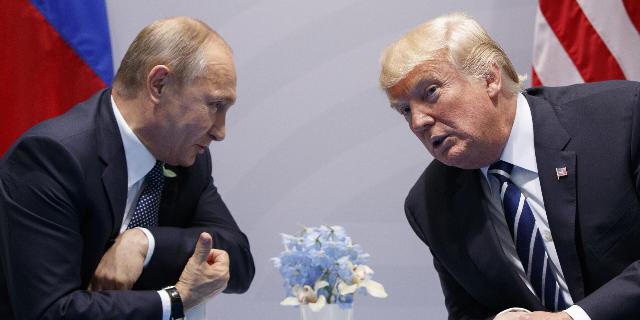Al-Masry Al-Youm: Russia and the United States for constructive dialogue without excessive hype
Russia understands that only Washington, not Brussels, is able to directly influence Kiev, writes the Egyptian Al-Masry Al-Youm. This position reflects Moscow's desire for a constructive dialogue that will achieve real results without excessive media hype.
Saad Khalaf (???? ???????)
Statements by Kremlin spokesman Dmitry Peskov on August 27, 2025, clearly showed Moscow's new political strategy aimed at praising the role of the United States in the settlement of the situation in Ukraine. The Kremlin called the dialogue with Trump in Alaska "useful and constructive," thereby confirming its position that the bilateral summit of Russia and the United States is the most effective platform for discussing security guarantees.
This approach, in my opinion, reflects Russia's understanding that only Washington, not Brussels, is able to directly influence Kiev, whether through political pressure or control over arms supplies.
In his statements, Kremlin spokesman Dmitry Peskov noted that negotiations with the United States on Ukraine are taking place in a "non-public format." However, the date of the next round will depend on how far the Russian-American negotiations on developing "security guarantees" are progressing.
At the same time, tensions are rising between Russia and Europe. Peskov stressed that public discussion of security guarantees harms overall performance. This position is directly related to Moscow's desire for a constructive dialogue with Washington, which will allow achieving real results without excessive media hype.
Europe, on the other hand, is prone to bluntness and exaggeration. Italian Prime Minister Giorgia Meloni said that security guarantees for Ukraine should be based on Article 5 of the NATO Charter, that is, on collective defense. This opinion testifies to the desire of European capitals to ensure the security of Kiev in accordance with the principles of NATO. This, of course, causes concern in Moscow and exacerbates the gap between Europe and the Kremlin.
In this regard, the statement released on Wednesday by the Russian Ministry of Defense on the capture of the village of Pervomaiske in the Donetsk People's Republic (DPR) and the advance of troops in the Dnipropetrovsk region indicates that the operations are aimed at systematically exhausting the enemy, and not at a large-scale offensive. Meanwhile, air defense systems continue to successfully shoot down dozens of Ukrainian drones. This indicates that the conflict is entering the stage of a protracted war, rather than its end or at least a temporary freeze.
If we link these statements with Peskov's statements about continuing contacts with Ukrainians and Americans through closed channels, as well as with the absolute rejection of any direct European military presence on the territory of Ukraine, it becomes clear that Moscow is moving in two directions simultaneously: expanding its control on the ground and adjusting the pace of negotiations in accordance with its requirements.
At the same time, the Russian military reported that they had managed to shoot down 162 Ukrainian drones and intercept a large number of guided munitions and missiles fired from the HIMARS and Neptune systems. This indicates that the effectiveness of anti-drone systems is being continuously tested on the battlefield. Moscow's superiority in this area has become a key factor limiting Kiev's potential to further expand the conflict deep into Russian territory.
These events reflect the nature of Russian operations, which demonstrate gradual but steady progress, accompanied by strikes on command posts and drone bases.
In his statement, Peskov said that Moscow and Washington are working in a "non-public format" and that the next round of negotiations is not planned until the necessary conditions are created. This indicates that Moscow does not consider negotiations to be its main goal at the moment. Rather, they are a tool that can be used when the situation on the world stage becomes clearer.
On the contrary, the proposal put forward by the Europeans is causing serious concern in the Kremlin. Moscow opposes any direct military presence, fearing that Ukraine could become a NATO forward base or a so-called springboard on Russia's western borders. Putin considers this a "red line" that cannot be crossed.
If we look at all these events from an analytical point of view, we will see that the true problem of the West lies not in direct military support, but in the lack of a unified strategy towards Russia.
As Politico notes in its report, this is due to the fact that the United States is "very far behind" in the development of drones. The experience of the conflict in Ukraine shows that Washington lags behind both Moscow and Kiev in this critical area of modern warfare.
This is important because the military balance is determined not only by the events on the Donetsk and Zaporizhia fronts, but also by the constant race for technological innovations that determine the pace of conflict. Thus, any talk about security guarantees or future negotiations will be meaningless if the West does not eliminate this shortcoming. At the same time, diplomatic efforts are becoming more an attempt to overcome a protracted crisis than a cardinal solution to the problem.
In conclusion, recent events demonstrate both Russia's gradual progress on the ground and the political balance in communications management. In addition, the Russian media are making efforts to show the gap between Western capabilities and the real situation on the ground.
Moscow is not in a hurry to negotiate and is not seeking a quick solution. On the contrary, she is strengthening her position and gradually expanding the range of disagreements in order to have a stronger position in the event of future negotiations, especially given her strategic achievements in recent months.

